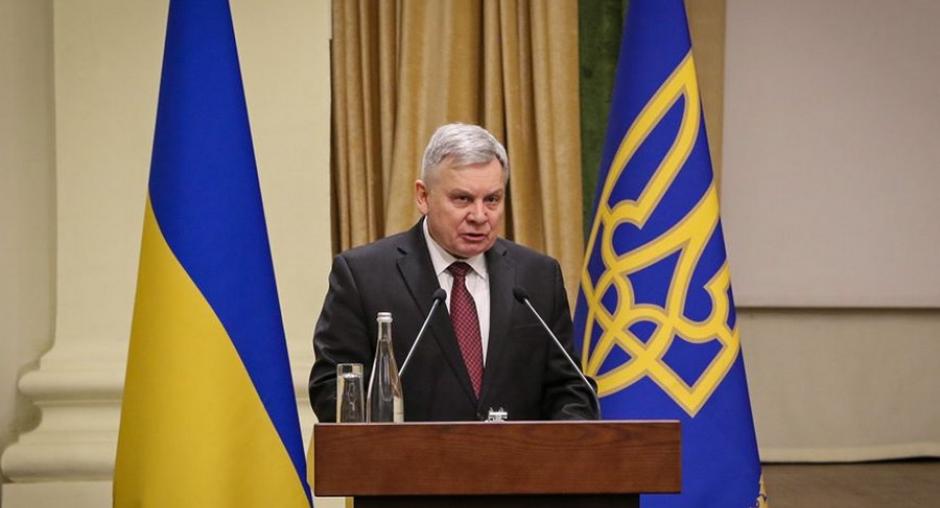Defence Minister Andrii Taran addresses last Forum for Security Co-operation meeting under Ukraine’s Chair

VIENNA / KYIV, 22 July 2020 – Ukraine’s Defence Minister Andrii Taran today addressed the last meeting of the OSCE Forum for Security Co-operation (FSC) under the country’s Chair. Addressing the meeting remotely from Kyiv, he said Ukraine had chaired this decision-making body during “unprecedented circumstances” of the COVID-19 pandemic crisis and “ongoing aggression on its territorial integrity and sovereignty.”
He spoke of the negative developments that continue to “further erode trust and confidence, decrease predictability and transparency, and undermine security in the whole OSCE area. These are the signs that urged us to open a frank discussion over the issues that might not be comfortable for all. However, the OSCE and its participating States should stand for its founding principles and seek solutions for a strong and coherent response, when these principles are severely infringed upon.”
“By shying away from these discussions, we will not be able to restore peace and security in Europe,” he added. “We put forward, for consideration of the Forum, those topics that reflect the root causes of these negative developments and its consequences for the entire OSCE community.”
Minister Taran provided an overview of the topics over the last three months, highlighting the Chair’s assessments of the discussions.
Turning to the impact of COVID-19 on politico-military security in the region, he pointed to misinformation and the effect of the pandemic on ongoing conflicts as serious concerns.
“We believe that extra attention should be paid to this topic due to its unpredictability and in view of the need to renew the verification activities under the politico-military instruments, and to improve adaptive measures within OSCE structures and field missions,” he said.
On the ongoing conflicts in the OSCE region, he said that, “we assess that more attention and involvement of the OSCE in processes” to improve the security situations are needed. “The enhanced monitoring of the situation by the Special Monitoring Mission to Ukraine (SMM) is important in order to provide an objective picture, even in a limited scope, due to ongoing restrictions of its freedom of movement,” he added.
Reflecting on the Chair’s priority with regard to small arms and light weapons (SALW) and stockpiles of conventional ammunition (SCA), Minister Taran welcomed the consensus on adopting the decision to hold the second Biennial meeting to assess the implementation of the OSCE documents on SALW and SCA.
Noting how illicit SALW and SCA contribute to instability, he emphasized the root causes of illicit trafficking of SALW and conventional ammunition, including across national borders in the conflict zones, and ongoing contamination of the territories with mines, landmines and unexploded ordnance. In this context, he stressed the importance of the full state border control by the Government of Ukraine to prevent the illicit trafficking of SALW and conventional ammunition, and to carry out humanitarian demining activities.
Moving to the Ukrainian FSC Chair’s next priority, he acknowledged “diverging views on the topic of hybrid threats and hybrid warfare” but added that “this should not discourage us from considerations on the challenges that are at the top of the list of security concerns in many participating States. A coherent international response to these threats is of paramount importance. Many participating States underlined the role that the OSCE can play through its various tools to respond to this cross-dimensional challenge.”
Coming to the implementation and modernization of the Vienna Document 2011 on Confidence- and Security-Building Measures, Minister Taran said “the overwhelming majority of the OSCE participating States support the process of modernization of the Vienna Document in order to more effectively meet the current challenges to the European security system through enhanced military transparency and predictability.”
Minister Taran wrapped up his address by noting that the Ukrainian Chair had also explored the OSCE role in implementing UN Security Council Resolution 1540 on the non-proliferation of weapons of mass destruction, and the Organization’s possible contribution to the Resolution 1540 Comprehensive Review process in 2021. The Chair had also focused on the activities and regulation of private military and security companies, and, together with Albania’s OSCE Chair, commemorated the 20th Anniversary of the UN Security Council Resolution 1325 on Women, Peace and Security, he said.
“Chairing the FSC for the first time in more than 20 years was an invaluable experience and honour for my country,” said Minister Taran. “Let me conclude by thanking all parties who assisted us during this journey.”
Germany assumes the FSC Chair on 31 August 2020.
